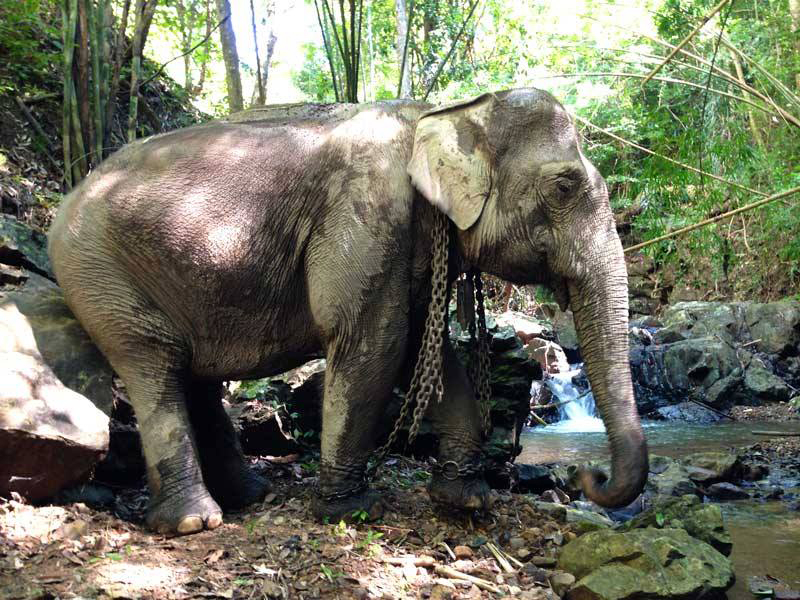If you were to tell Sundari Sitaram three years ago that she’d be spending her 51st birthday on her way to live in a bungalow in rural Thailand, she’d have never believed you.
“I thought living out of your backpack was something you did in your 20s, so it’s pretty funny to be 51 and living in the jungle,” she said.
In October, the former Camas woman sold everything she owned to buy a one-way ticket to a place more than 7,000 miles away from her comfortable life. And though moving across the world was a tough decision, it came down to one thing for Sitaram: the best way to create real change when it comes to the treatment of elephants in Southeast Asia was to be there.
“Although the personal and professional circumstances that brought me here were difficult to embrace at first, there is a tremendous amount of good and an equal amount of wonder that reveals itself daily,” Sitaram said in an email. “Being immersed in cultures that are foreign in every single regard challenges the way I think about almost everything, and not having people I love around me pushes me to redefine who I’m becoming.”
Sitaram is the founder and executive director of Heart of Ganesh, a Clark County nonprofit group that seeks to educate and empower others to take compassionate action for captive and endangered elephants.
Sitaram formerly owned a yoga studio in Vancouver before learning about the plight of Asian elephants, some of which were killed and others kept in captivity. In 2013, she took a seven-week trip to the area and learned about the complex socio-economic reality behind the problem, and came back to Clark County and formed the Heart of Ganesh. For the past few years, she and other volunteers worked to solve the complex problems.
But now, she’s back near the elephants she’s trying to help.
“There was still a lot of field work to do that couldn’t be done from home,” Sitaram said. “(I had a) sense that some of the most intricate components that could effectively enable real change were still missing from the big picture. It seemed the only way to truly understand the complexities was to immerse myself fully into the various cultures and countries that struggle with Human-Elephant Conflict.”
Sonja Bilden, the nonprofit’s president, said that with Sitaram away, the nonprofit is running well. Bilden and the organization’s volunteer base keep the fundraising efforts going while doing local projects, such as working to do presentations in schools.
“Thank God for technology,” she said. “Because of the different videoconferencing that exists, we’re able to connect pretty smoothly.”
After leaving the U.S. on Oct. 12 with all her material possessions on her back, Sitaram spent a month settling into life in northern Thailand: communicating with gestures, eating lots of rice, and adjusting to seeing geckos and large spiders share her home.
She then began making trips to elephant camps to better understand the elephant tourism industry. There, she gathered information to help build the organization’s campaign for humane elephant tourism.
People who claim to love elephants, Sitaram said, put “elephant ride” at the top of their bucket list. But Sitaram said that the fun time for those visiting comes with a price to the animals: abuse.
“What elephants endure behind the scenes to carry tourists in a chair, play darts, ride a bike or twirl a hoop is something you’ll never, ever forget if forced to see it, and simply does not need to happen,” she said. “As long as people pay for riding an elephant or buying circus tickets, the abuse will continue. … Money perpetuates the cruelty; awareness can end it.”
To tackle this issue, she said, the campaign will focus on reaching the international travel agencies, local tourism companies and public forums such as Trip Advisor.
Temples, rice paddies
This month, Sitaram is also visiting Sri Lanka to work on other efforts in which the nonprofit is involved. One project involves working to change the fate of temple elephants, which are left chained outside of Buddhist temples as a status symbol. That project includes a letter-writing campaign to free one elephant, Ganga, by asking people to send letters which will go to the Sri Lankan government and leaders of the temples.
The other project works to help resolve the human-elephant conflict, which in part of Sri Lanka results from farmers having planted their rice paddies in paths regularly traversed by elephants. The elephants trample on and eat the rice, and villagers try to deter and disrupt this, resulting in deaths for both people and elephants.
Project Orange Elephant provides these families with orange trees to screen out their rice fields. Because the scent of oranges deters elephants, the crop acts as way to mitigate this problem and provide farmers with another crop to eat and sell.
“Our intent is to raise enough funds to get every single family (more than 70 very poor subsistence farmers in central Sri Lanka) the border of citrus trees they need to help keep wild elephants away from their rice paddy,” Sitaram said.
Bilden and another board member will take a trip to join Sitaram in Sri Lanka.
Ultimately, Sitaram said, the decision to come back to Camas will be based on her visa and money. But before she goes, she said she hopes to walk away having learned more about what she can do.
“(I hope to) have a new understanding of my place in the world, professionally and personally, and to love what that place is,” she said.
Bits ‘n’ Pieces appears Fridays and Saturdays. If you have a story you’d like to share, email bits@columbian.com.




